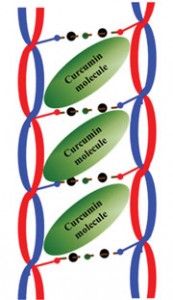US scientists have encapsulated a nutraceutical – a dietary supplement with medicinal benefits – inside hydrocolloids to deliver it intact into the human body in food.
Currently, nutraceuticals’ applications in food are ‘limited by poor water solubility and instability under normal processing and storage conditions’, says Srinivas Janaswamy from Purdue University. To address this problem, Janaswamy and his team encapsulated curcumin molecules (a plant phenol found in turmeric with anti-cancer, anti-inflammatory and anti-obese properties) inside water pockets in crystalline hydrocolloid fibres.
Hydrocolloids – in which the colloid particles are dispersed in water – are already used as thickeners and gelling agents in food. The hydrocolloid Janaswamy’s team used was a sodium salt of iota-carrageenan, which is cheap and holds a generally recognised as safe (GRAS) status. It belongs to a family of polysaccharides extracted from marine algae for use in food and pharmaceutical applications.

Schematic encapsulation of curcumin in the hydrocolloid matrix. The filled circles are cations (black), water molecules (green) and sulfate groups (red and blue)
Read the full article in Chemistry World
Link to journal article
Hydrocolloid-based nutraceutical delivery systems
Srinivas Janaswamy and Susanne R. Youngren
Food Funct., 2012, Advance Article, DOI: 10.1039/C2FO10281A










